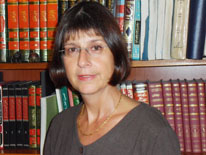Prof. Irene Schneider
Islam in Europe, law and society in contemporary Muslim states, critical hadith-research, gender
Prof. Irene Schneider is Professor of Arabic and Islamic Studies and currently Head of the Department at the University of Göttingen. She received her PhD from Tuebingen University in 1989 and published her Dissertation under the title “Das Bild des Richters in der adab al-qadi-Literatur”. In 1996 she finished her habilitation at the University of Cologne with a study published under the title “Kinderverkauf und Schuldknechtschaft. Untersuchungen zur frühen Phase des islamischen Rechts” (English short version in the article: Freedom and Slavery in Early Islamic Time (1st /7th and 2nd /8th centuries), in: al-Qantara. 28. 2007, S. 353-382). In 2008 she turned down the offer of the Chair “Islamic Studies and Gender Studies” at the University of Zurich and in 2014 the offer of the Sharjah Chair of Islamic Studies at the University of Exeter/UK.
As a scholar of Arabic and Islamic Studies, her research focus is on the Middle East, an area that has globally attracted enormous political attention in post-colonial times and especially in the last decades. It might well be a best example of “multiple” modernities (S. Eisenstadt) with its undeniable intensification of the religious discourse in the last decades. In her research, she deals with two core questions and their intersections with regard to this area: gender and Islamic law. The latter, being the normative application of the Islamic religion, is placed at the center of all political debates in the Muslim states, from Morocco to Indonesia. In particular, her focus is on the restoration of “Sharia” and the debate about how the Sharia can or cannot be adapted to “modernity”. Her main research questions are: How do gender and law intersect in social and political debates concerning legal questions? How are men’s and women’s rights and obligations defined? How are masculinity and femininity and how is sexuality and the family constructed and negotiated in these debates? Is there a discernible influence of international law, in particular CEDAW (Convention on the elimination of all forms of discrimination against women) on the national legislation? She has already studied these topics especially with regard to Iran and Palestine. Her recent research as well as teaching concentrate furthermore on the Israel-Palestine-conflict and its (im)possible solution as a main factor to ensure peace and stability in the region and internationally.
Details
Georg-August-Universität Göttingen – Department of Arabic and Islamic StudiesContact
Heinrich-Düker-Weg 14
37073 Göttingen
Phone
+49 (0)551/ 39-2 9493
Email
ischnei@gwdg.de